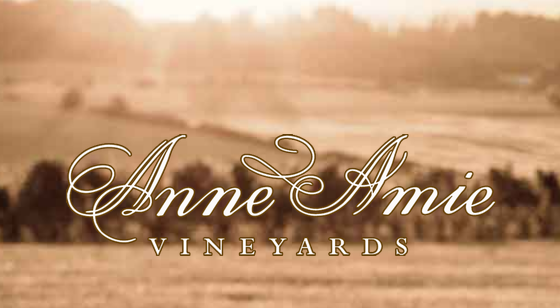Explore Oregon Wines: Wineries | Varietals | AVAs | Cellar 503 Selections

Anne Amie Vineyards 2022 Muller Thurgau
AKA Rizlingszilváni
The business of winemaking is a team sport. Nowhere is the importance of team more evident than at Anne Amie Vineyards. Sure, owner Robert Pamplin is a powerhouse of a businessman, philanthropist, farmer, minister and author of 13 books, including two book-of-the-month-club selections. He has earned degrees in business, economics, accounting, education and theology. Winemaker Jay Somers is known as an innovator & one of the top winemakers in our state. Anne Amie's vineyards are tended to by Santiago Garza Jr. who's attention to plant growth is impressive, but we can't talk about Anne Amie without talking about the extraordinary experience of being at Anne Amie. The best view in the Willamette Valley is complemented by the friendliest and most helpful tasting room staff.
Carrie told me a story once of how she often dragged her nine-year-old son along in her wine country travels ("oh no, mom, not another winery!") One hot day, the tasting room manager spotted him bored and frustrated (and about to cause some trouble) when she invited him to check out the "secret" barrel room downstairs where it was nice and cool. He loved exploring the hidden places, and now asks us to invite his friends along to visits at Anne Amie.
Anne Amie is a favorite spot to show off for out-of-town guests, and we attend many of the special events at the winery. They make great wine, but it's the people in the cellar, the vineyard and the tasting room that bring all of us back again and again.

Cellar 503 Tasting Notes

Anne Amie Vineyards, Carlton, Oregon
2022 Muller Thurgau
Our estate-grown Muller-Thurgau comes from vines first planted in 1979. Crisp, fresh, and dry, it is a charming example of the variety at its best.
Aromas: honeysuckle, key lime pie, white flowers, starfruit, kumquat, crushed gravel
Flavors: key lime, yellow grapefruit, golden delicious apple, feijoa
Finish: dry, mineral
Suggested Food Pairings: paella, Pad Thai, tuna poke, moules frites, grilled oysters, ceviche
Grapes were hand-picked and brought directly to the winery in 1/2 ton totes in perfect condition. They were whole cluster pressed and placed into temperature controlled stainless steel fermenters, where they were slowly fermented at 45°F for maximum varietal character. The wine aged on its lees for four months before being bottled.
Varietal Composition - 100% Muller-Thurgau
Vineyards - Anne Amie Estate
Soil Types - Willakenzie
AVA – Yamhill-Carlton
Alcohol – 12.8%
Total Acidity – 7.3 g/L
pH - 3.28
Residual Sugar – 0.28%
Back to School
Müller-Thurgau is a white grape variety (sp. Vitis vinifera) which was created by Hermann Müller from the Swiss Canton of Thurgau in 1882 at the Geisenheim Grape Breeding Institute in Germany. It is a crossing of Riesling with Madeleine Royale. It is used to make white wine in Germany, Austria, Northern Italy, Hungary, England, Australia, the Czech Republic, Slovakia, Slovenia, New Zealand, Canada, the United States, Belgium and Japan. There are around 22,201 hectares (54,860 acres) cultivated worldwide, which makes Müller-Thurgau the most widely planted of the so-called "new breeds" of grape varieties created since the late 19th century. In 2007, the 125th anniversary was celebrated at the Geisenheim Grape Breeding Institute.
When Dr. Müller created the grape in the Geisenheim Grape Breeding Institute in the late 19th century, his intention was to combine the intensity and complexity of the Riesling grape with the ability to ripen earlier in the season that the Silvaner grape possesses. Although the resulting grape did not entirely attain these two qualities, it nonetheless became widely planted across many of the German wine-producing regions.
By the 1970s, Müller-Thurgau had become Germany's most-planted grape. A possible reason for the popularity of this varietal is that it is capable of being grown in a relatively wide range of climates and soil types. Many of these vines were planted on flat areas that were not particularly suitable for growing other wine grapes because it was more profitable than sugar beet, which was the main alternative crop in those locations. The vines mature early and bring large yield quantities, and are less demanding as to planting site than for example Riesling. Müller-Thurgau wines are mild due to low acidic content, but nevertheless fruity.
Müller-Thurgau is also known as Rivaner (Austria, Germany, Luxembourg, and especially for dry wines), Riesling x Sylvaner, Riesling-Sylvaner, Rizvanec (Slovenia) and Rizlingszilváni (Hungary).
A Cellar 503 selection in September 2024, Back to School Yamhill-Carlton | Müller-Thurgau
